 United Nations Days are like Saints Days in the Catholic Calendars. They are reminders of the wider world beyond our own homes, cities and nations, often reminders of the violence inflicted on good people, and are also occasions for thanksgiving and celebration.
United Nations Days are like Saints Days in the Catholic Calendars. They are reminders of the wider world beyond our own homes, cities and nations, often reminders of the violence inflicted on good people, and are also occasions for thanksgiving and celebration.
The day dedicated to the world’s Indigenous peoples reminds us that we in Australia are not alone in occupying the land once occupied by other people with their own rich language and culture. Most nations in our region are composed of early inhabitants and later arrivals.
Nor are we alone in reckoning the effect that the later arrivals’ seizure of land had on Indigenous people. In both North and South America, as in
Australia, Indigenous peoples were hunted down and marginalised by the later arrivals. It is less than a century from our emergence from the colonial period, when European nations assumed the right to take control over other peoples and their lands.
We are reminded also of our obligation to seek reconciliation with our Indigenous peoples, recognising their prior ownership of the land and the claim that they still make on us. Our own self-respect as nations depends on us owning our history and making up for the destructive effects that settlement had on Indigenous peoples.
This day reminds Christians, too, of our ambiguous relationships with Indigenous peoples. Many European powers justified their exploitation of other lands and peoples by claiming they had a duty as Christians to conquer the original inhabitants and to make Christians out of them. But in many places, too, Christian churches protected Indigenous people from worse oppression and even from extermination, by providing some shelter for them. The Christianity that was brought, however, embodied only imperfectly the call to embody the Gospel in all nations, peoples, cultures and languages.
If for the Indigenous people of the world this day is a sobering reminder of wrongs done, it can also be an occasion for shared thanksgiving and celebration. We can be thankful that in our world today so many Indigenous people have survived, despite the sufferings, injustices and humiliation they have suffered, and that they remain proud of their culture and languages. Their faithfulness in keeping alive what was at such great risk of dying out is surely to be celebrated. We can be thankful, too, for the gift that they are to us. They ensure diversity in our nations in the face of the many forces that try to eradicate difference.
This day reminds us all that our world is wider than our nation, that our nations are more than the peoples who presently rule them, and that God is larger than our local churches. For us at Jesuit Social Services the day is an occasion for thanksgiving for the Indigenous people whom we serve and who work with us, and a reminder that our mission extends beyond our own shores.